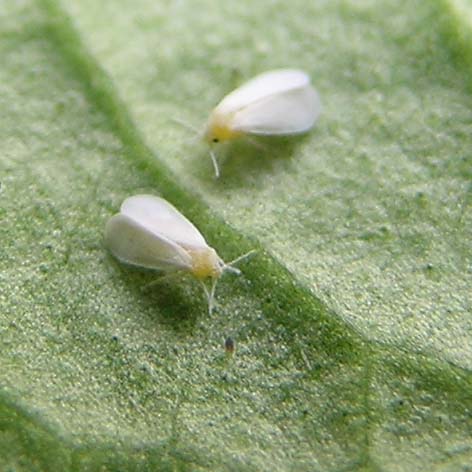Whiteflies are another pest that can infest your garden. They are a little harder to detect compared to other garden pests because they thrive on the underside of leaves. You have to keep your garden clean and inspect leaves regularly to prevent these sap-sucking insects from thriving. But what if they already are? The biological control of whiteflies is a good pest control method to try.
Why you should consider biological control
Biological control is simply the control of pests like whiteflies by introducing their natural enemies or predators. You are basically letting nature do the pest control for you.
- Whiteflies can have insecticide resistance. Whiteflies are some of the most invasive organisms in the world, particularly affecting crop plants and yield. Many countries try to control these pests with insecticides. But because of poor application and the use of excessive doses, whiteflies are slowly developing insecticide resistance. Biological control suddenly becomes a good alternative because it doesn’t involve the use of ingredients that whiteflies can resist.
- Insecticides can be toxic to your plants. Phytotoxicity is the damage to plants caused by outside factors, such as the whiteflies themselves or the insecticides used to kill these garden pests. Considering that insecticides are made of chemicals and other strong formulations, it isn’t surprising that they may end up damaging the plants they are meant to protect. Plants suffering from phytotoxicity can experience a delay in development, poor germination, and even death.
- Insecticides can be toxic to you and your family. Insecticides have ingredients that are meant to kill pests. Unfortunately, these ingredients can affect humans as well. Pesticide exposure has many adverse effects, including dizziness, burning of the skin, and irritation of the nose or throat. If you choose biological control, you remove the risk of pesticide exposure.

Biological control options for whiteflies
Another great thing about biological control is that it mostly involves the introduction of beneficial insects. You don’t have to worry about these insects as they thrive on your property’s exterior. As their name suggests, they are actually beneficial to have, primarily because they prey on garden pests like whiteflies.
- Introduce parasitic wasps into your garden. Parasitizers are a category of beneficial insects, and they are mostly composed of parasitic wasps. These wasps lay their eggs on whiteflies. And when the eggs hatch, the larvae feed on the unfortunate garden pests. Take note that parasitic wasps are not dangerous to humans. They are not the same as the stinging wasps you immediately imagine when you hear the word “wasps.”
- Try predatory lady beetles. Predatory lady beetles are great for the biological control of whiteflies because they have a high whitefly consumption rate and relatively long life. Adult predatory lady beetles eat about 10 whitefly eggs a day to survive and live for up to two months. It also helps that they lay their eggs near clusters of whitefly eggs for easy access to food. You may see better results if you complement predatory lady beetles with parasitic wasps. Your garden just becomes a deadly place for whiteflies.
- Don’t disregard pathogens as an option. Biological control doesn’t just involve beneficial insects. It can also involve fungi. Beauveria bassiana is one of the best options for whitefly control. It is an entomopathogenic fungus that spreads a disease that affects and kills a variety of insects, such as aphids, mites, thrips, and yes, whiteflies. This means that it can help control not just whiteflies, but also other common garden pests.
Other natural control options to consider
Biological control is not your only option. There are other ways to get rid of whiteflies naturally. You can manually remove the whiteflies yourself or use insecticide alternatives. These can be great options because they save you from all the complications involved with beneficial insects and pathogens.
- Remove whiteflies by hand. Wear gloves and use a soft cloth to capture or wipe away whiteflies. It’s a very straightforward approach. It can be very effective, but the downside is that it can also be very labor-intensive. You may have to heavily inspect your plants one by one, check their undersides, and cut off heavily infested leaves. But at least you are not exposing your plants to artificial concentrations that can cause more harm than good.
- Vacuum them up. Use a small or handheld vacuum cleaner to vacuum up the whiteflies infesting your plants. Simply run your vacuum cleaner on your infested plants and let it do all the work. Make sure to only use a small or handheld vacuum cleaner. The problem with big vacuum cleaners is that their sucking power may be too strong for your plants and may end up causing more damage. Young and sensitive plants are especially vulnerable to strong vacuum cleaners. When the vacuum cleaner is full, empty it in a garbage can, preferably in one that is far away from your home to prevent the whiteflies from coming back.
- Use natural sprays as insecticide alternatives. You can get rid of whiteflies even with just water. The water pressure is enough to dislodge whiteflies and their eggs. But remember to use a small hose or spray. The water pressure from a big hose may be too overpowering, especially for young and sensitive plants. You can make water more potent by mixing in some dish soap or vinegar. But before you apply your mixture to your entire garden, test it out on a few leaves to see if there will be adverse effects. Some plants can be very sensitive to soapy water and vinegar.

Get rid of whiteflies with biological control
The biological control of whiteflies is a good way to get rid of whiteflies naturally. It mostly involves the introduction of beneficial insects and pathogens that can kill whiteflies and at the same time protect your garden from other garden pests.
However, take note that biological control is not the be-all and end-all of natural options. There are other natural whitefly control options out there, and they may even be better for you because they are more straightforward. But if you think they are still too complicated, you can always just hire pest control professionals and let them deal with your whitefly problem.

